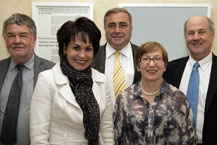Latest News Archive
Please select Category, Year, and then Month to display items
02 January 2025
|
Story Gerda-Marie van Rooyen
|
Photo Supplied
 Leading the research in South Africa is Prof Linus Franke from the Department of Soil, Crop and Climate Sciences.
Leading the research in South Africa is Prof Linus Franke from the Department of Soil, Crop and Climate Sciences.
Scientists are actively pursuing the successful breeding of diploid hybrid potatoes from inbred lines. This is expected to revolutionise potato breeding as it holds the key to rapid genetic progress. It will introduce new varieties for commercialisation through seed. Currently, existing potato variants have a gene that renders self-pollinated seeds infertile.
Prof Linus Franke, an academic in the Department of Soil, Crop and Climate Sciences at the UFS, is leading the research in South Africa. “This technology allows the production of genetically uniform potato seed that is easy to transport and largely disease-free.” He says this differs from conventional breeding whereby only vegetative propagation is possible due to tetraploid varieties in potatoes. It also risks carrying pests and diseases from one generation to the next – leading to the accumulation of pests and diseases with each round of multiplication.
Seed innovation
Prof Franke explains that Solynta BV, a seed company based in the Netherlands that produces potato varieties that can be grown from seed, has included South Africa in their research efforts because it is one of Africa’s largest producers and exporters. Through his academic relationship with Wageningen University and Research, a Dutch institution renowned for its agricultural endeavours and food production, the UFS became involved in researching hybrid potatoes grown from seed.
Diploid seeds containing two sets of chromosomes allow easier gene manipulation to increase predictability and speedier genetic progress. The breeding approach enables the incorporation of tolerance to pests, diseases, abiotic stresses (cold, heat, drought) and other desired genetic traits.
Although Prof Franke is optimistic about this research, he is not blind to disadvantages. “Potato seeds are tiny and have little energy reserves, making it harder to grow potatoes from seed than from tubers.” He says potatoes from seed will take longer to cultivate than tubers, as farmers need to grow plantlets from seeds first, adding six weeks to the growing period. “It is possible that commercial farmers can grow potatoes directly from seed. Alternatively, perhaps more likely, specialised growers will produce tubers of potatoes from seed; these tubers are then sold as seed tubers to other potato farmers, who then continue their normal practices of producing potatoes for the market from tubers.”
Financial benefits
Prof Franke says farmers have reason to get excited. “Seed potatoes will reduce input costs, as varieties with enhanced tolerance to pests and diseases require less pesticides. Planting one hectare of potatoes requires three to four tonnes of potato tubers, but only one 25 g packet of potato seeds.” Since potatoes are a more valuable commodity than maize, this technology might also increase farmers’ income potential.
Good practice discussed during workshop of the ACU Benchmarking Programme
2012-09-10
 |
|
From the left are: Prof. John Brennan, assessor from the Open University in the UK; Prof. Driekie Hay, Vice-Rector: Academic, UFS; Mr Cliff Wragg, ACU Benchmarking Programme Manager; Prof. Ellen Hazelkorn, assessor from Dublin Institute of Technology in Ireland; and Mr Mike Gallagher, Executive Director of Go8 in Australia.
Photo: Johan Roux
10 September 2012
|
The ACU University Management Benchmarking Programme presented a workshop on the Bloemfontein Campus of the University of the Free State (UFS) from 27 to 29 August 2012.
The programme offers a unique and cost-effective opportunity for participating universities to compare their key management processes with those in a range of other universities. This helps to identify areas for change and assists in setting targets for improvement and identifying techniques for managing change. The outcomes of the programme provide models of good practice. It creates the opportunity for networking and a workshop, guided by internationally acknowledged subject experts. This year representatives from universities in among others Australia, the South Pacific, Canada, the United Kingdom (UK) and South Africa attended the workshop. The topics discussed were financial management, managing league tables and ranking and managing graduate outcomes.